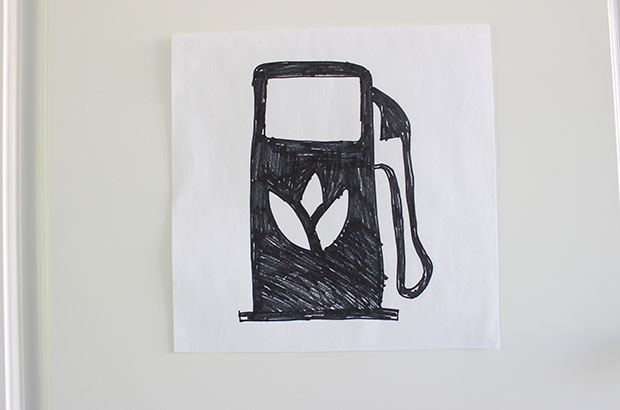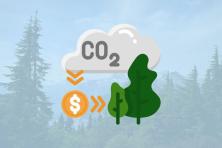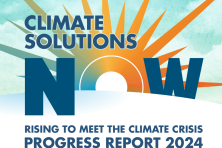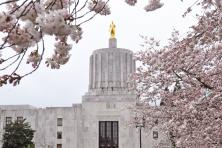The Puget Sound Clean Air Agency’s (PSCAA) effort to enact a regional clean fuel standard reached final stages with two lengthy public hearings on Thursday, December 19, 2019. The Agency’s Board of Directors heard over six hours of testimony and has been fielding thousands of public comments in support of the rule.
Strong support for the regional clean fuel standard was clear with at least over 60 testifying as the evening hearing started. Statements covered a wide range of topics including the potential for reduced overall transportation costs; cleaner air and improvements to public health; increased investment and economic development in electric vehicles, renewable fuels, and circular economy technology; and the urgent imperative to address climate change and reduce transportation emissions.
The American Lung Association, WA Physicians for Social Responsibility (WPSR), and the Washington Academy of Family Physicians see a Clean Fuel Standard as one of the most important ways to improve public health by decreasing sources of air pollution. At the national and global level, an increasing number of health organizations list climate change and increased emissions as a severe threat to public health.
Dr. Jeffrey Duchin, King County public health officer and WPSR member stated, “As medical professionals, many of [us] know firsthand the harmful health effects of climate change on patients. Transportation-associated emissions include toxic compounds that increase respiratory ailments like asthma and bronchitis, COPD, exacerbate cardiovascular disease and heighten the risk of life-threatening conditions like cancer, and burden our health care system with substantial medical costs.”
This evidence of support follows recent resolutions passed by the cities of Spokane, Issaquah, Bainbridge Island, and Tacoma in support of clean fuels, as well as a signed letter of more than 120 city, county, and port elected officials urging PSCAA to adopt a clean fuels policy.
Former mayor and current city council member for Mercer Island, Bruce Bassett, spoke on behalf of local elected officials in support of clean fuels speaking to cities’ commitment to address climate change and excitement about the possibility for growth and innovation. “We have committed to taking action to reduce GHG emissions and to spur investment in a clean energy economy...creating local economic development...by investing more of our...dollars in clean fuels produced right here in Washington.”
A regional clean fuels policy in PSCAA’s four counties (King, Pierce, Kitsap, Snohomish) would create a market approximately the same size as Oregon’s market, and improve air quality in some of Washington’s most heavily polluted areas such as freeway corridors, improve public health, and increase choices for cleaner transportation such as electric vehicles. The PSCAA adopted economy-wide emissions targets of 50 percent below 1990 levels by 2030. A regional or statewide clean fuel standard is a critical component of meeting these targets.
Business support is growing with over 60 businesses statewide signing their support for cleaner fuels.
“The difference between aggressive climate policy and a status-quo of continued fossil fuel pollution will likely determine whether Crystal remains a thriving ski resort,” said Josh Rubenstein, Environmental Sustainability Manager with Crystal Mountain Resort.
“Washington business support for clean fuels is similar to that seen during California’s campaign to pass its clean fuel standard policy,” stated Sam Wade of the RNG Coalition working in California, “More than 150 businesses signed in support of low carbon fuels in California, [where] there has been no consumer backlash about changes in consumer prices and we think you’ll see very similar results here in WA.”
The greatest threat to global health in the 21st century
Transportation pollution is Washington State’s largest sources of air pollution linked to asthma, lung cancer, and other respiratory diseases. Hearing testimony included multiple representatives from health organizations, physicians, and advocates stating that reduced emissions and cleaner air has direct positive health impacts and reduces costs of public health across all communities. Burning fossil fuels releases all kinds of particulate matter and pollution in the air, including microscopic, ultrafine particles so small that they get deep into our lungs and bloodstream. This pollution causes serious health problems like premature death in people with heart or lung disease, aggravated asthma, decreased lung function and increased coughing or difficulty breathing.
A Clean Fuel Standard has had strong support in 2019 among a diverse group including public health groups, local elected officials, automobile manufacturers, environmental justice groups, clean energy businesses, and science and medical professionals.
A Clean Fuel Standard requires oil producers and refiners to reduce the carbon intensity of gasoline and diesel, providing consumers with cleaner-burning transportation fuels. Washingtonians spend about $9 billion annually on mostly imported gasoline and diesel, while many locally-produced clean fuels are shipped to other states with working clean fuel standard policies like Oregon, California, and British Columbia. Requiring cleaner fuels for internal combustion engines is the baseline for creating pathways towards cleaner transportation options, like adding electric vehicle infrastructure, exploring electric vehicle car sharing programs, and promoting investments in renewable clean bio-diesel and renewable natural bio-gas.





